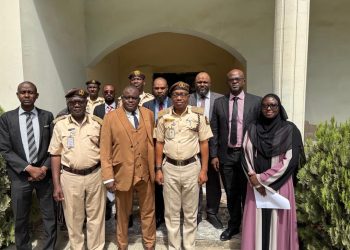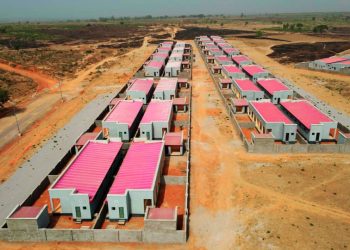By: Mnena Iyorkegh, Abuja
The Economic Community of West African States (ECOWAS) Court of Justice and the United Nations High Commissioner for Refugees (UNHCR), are to Strengthen partnerships towards sustainable programmes.
The partnership is to assist vulnerable members of the society in the ECOWAS Region, have access to justice.
This was disclosed during a courtesy visit by the UNHCR high-level delegation to the Vice President of the ECOWAS Court of Justice, Justice Gberibe Ouattara, in Abuja, Nigeria’s capital.
This meeting also highlighted the common desire of both institutions to strengthen their collaboration on the protection of refugees and stateless people within the community space.
The Vice President of the ECOWAS Court of Justice, Gberibe Ouattara, explained that the prevailing humanitarian situation in the ECOWAS Region, is as a result of conflicts leading to displacement of populations and food insecurity, particularly in the Sahel and Lake Chad Basin Regions, which needs urgent attention.

Justice Ouattara, while expressing gratitude of the Court to UNHCR for its continued commitment in protecting human rights globally, underscored the need for stronger partnership between the two institutions noting the immense benefits of this partnership for the Community citizens. He called for deeper collaboration with the UNHCR in the area of access to justice and human rights protection which are joint mandates of both organizations.
“The court is open for any relation with the UNHCR this is a relationship that has existed for many years now, anD alot id things have been done together, it is in the hope of the court that we will be able to further strengthen the bonds of this relations with the UNHCR, so refugees ans stateless persons when they are involved in a legal process the court agrees that the UNHCR intervenes either through a lawyer or as an expert to provide a technical perspective regarding the status of the individual involved. The court is ready and willing to go even further with you in order to strengthen our relationship because is a beneficial one that contribute to upholding human rights. We are ready to provide any answers that you may seek from us. Mr. Ouattara, said.
The ECOWAS Court Vice President also informed the UNHCR delegation that: “there are currently about 7,337,979 forcibly displaced population due to conflicts, violence and disasters in the ECOWAS Region, including 6,526,928 Internally Displaced Persons (IDPs) and 811,051 refugees and asylum seekers.
Justice Ouattara also recalled the crucial role of the UNHCR as amicus curiae (friend of the Court), particularly in cases involving refugees and stateless persons.
He also urged the UNHCR to continue to support the ECOWAS Commission and Member States to implement their Global Refugee Forum (GRF) pledges.
“ECOWAS has committed about 9 million USD from the Humanitarian budget in 2024 to assist refugees, IDPs, asylum seekers and stateless persons, ECOWAS will continue to work with UNHCR to achieve durable solutions in the management of refugee situations while working towards the reduction of displacements and its eradication in the Region”. He said.
The UNHCR Assistant High Commissioner for Operations, Mr. Raouf Mazou, who is Head of the delegation, commended ECOWAS on the Regional Policy on Asylum being developed and assured them that the UNHCR will work closely with ECOWAS to implement programmes.
He added that a regional approach and strategy will be needed for the current humanitarian situation in the Region.
In the same vain, the Assistant High Commissioner for Protection, Ms. Ruven drini Menikdiwela, commended the court for the initiative.
“We thank the court for its collaborations with the initiative it has taken to ensure the rights of refugees, internally displaced Persons and Stateless Persons within the ECOWAS Community, are respected through the decision of the court. Beyond the competent of the court and beyond the space of ECOWAS Community, we have carried over amended activities regarding the protection of refugees and stateless persons worldwide; which is of course a global mandated that we have. We do have the presence of in one hundred and three countries, and one hundred and five location. We are working with the court to ensure that the Host Government respect the rights of refuges and internally displaced persons”. Ms. Menikdiwela said.
Speaking on the technical assistance and how to ensure that vulnerable people are able to make their case when their rights are violated.
“Our intervention before the court, and not just before ECOWAS Court but also before the Court of Justice, Human rights and American human right. We highlight legal issues of importance for the right of refugees or for the stateless persons. We do not intervene individually in individual cases but more on the point of law, which may impact not just on that individual case, but on the interpretation of the law in relation to future cases of the same issue”. She said.
It will be recalled that the ECOWAS Commission and UNHCR renewed the Memorandum of Understanding (MoU) between the two organisations in 2023 amidst increased violent conflicts, disasters, and insecurity in some Member States.














